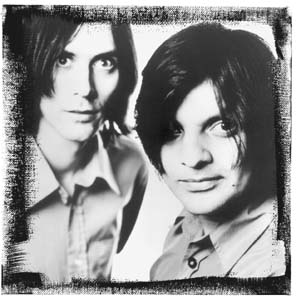![[Metroactive Music]](/music/gifs/music468.gif)
[ Music Index | San Jose | Metroactive Central | Archives ]
Around The Cornershop
Tjinder Singh and Ben Ayres--a.k.a. Clinton--throw a global party on their new album, and everyone is invited
By Michelle Goldberg
IT'S BECOME something of a commonplace in the last few years for bands to treat the whole world--and the whole history of music--as a gigantic bazaar from which to pick and sample. Still, the English band Cornershop is special.
On albums like Hold on It Hurts and When I Was Born for the 7th Time, lead singer Tjinder Singh borrows from his Punjabi heritage to create loose-limbed, funk-tinged indie rock with delicious strains of Bollywood film songs and classical sitar rendered psychedelic by their giddy new context.
Unlike ironic indie artists such as Beck and Cake, Cornershop creates music coursing with sweetness and a sincerity that is both wide-eyed and worldly. The ingredients to the band's best, most recent album, When I Was Born for the 7th Time, never sound like rummage-sale finds.
Instead, the record is like a sonic biography of transglobal obsessions and enthusiasms. There are spoken-word vocals by Allen Ginsberg on "When the Light Appears Boy," a witty Punjabi-language version of the Beatles' sitar-flavored "Norwegian Wood," an elliptical tribute to Bollywood starlet Asha Bhosle and a song about relishing Britain's newly vibrant music culture, "Seems Like the Funky Days Are Here Again."
Sure, the whole album is buttered with kitsch, but it is held together with warm, uncynical soul.
Urban Nomads
THE DEBUT ALBUM from Clinton, the side project of Singh and Cornershop guitarist Ben Ayres, works for much the same reasons. Call it authenticity--though not at all in the PC sense.
Unlike the indie-rock-based Cornershop, Clinton's Disco and the Halfway to Discontent (Luaka Bop/Astralwerks) is dominated by hip-hop and electronic music. But the particular wistful-delirious Cornershop feeling is the same.
With electronic music, people often talk about bedroom producers. The same term could be applied to Beck, no matter how fancy his equipment is now--his influences sound like bits and pieces absorbed secondhand, as if he had garnered his inspiration from TV and CDs and the radio.
For some ineffable reason, the elements in Clinton's pastiche seem much more immediate, like treasures collected by urban nomads at home everywhere and nowhere.
Take "Welcome to Tokyo, Otis Clay," a rich, rousing number built around a sample of female soul singers crooning, "Loving you, oh oh," layered over snatches of dialogue in a deep male voice that could be Otis Clay himself, bits of a woman speaking French and a steady groove provided by buoyant, organic drumming. In itself, the song is tasty and insinuating; listening to it, you can't help but grin and start to move.
But the track takes on extra meaning when you consider that Chicago soulman Otis Clay, while relatively obscure in America, is utterly venerated in Japan. In fact, in 1983 he released an album called Soul Man Live in Japan.
Taken with the title, the "loving you" loop is about the appreciation Clay finally found on the other side of the world. Viewed that way, "Welcome to Tokyo, Otis Clay" becomes an exuberant ode to finding a home in the most foreign of places, something that Singh surely understands.
Gurgling Loops
IN THE PAST, Singh has been an outspoken anti-racist. In 1996, the band released a single called "Wog," a British epithet for Indians. Disco and the Halfway to Discontent is a kind of anti-nationalist fantasy, a vision of an all-inclusive global party to which everyone is invited.
That global ethos is surely what led Singh and Ayres to call their band Clinton in the first place--after all, there's probably no name more universally recognizable, no other joke on earth that almost everyone gets.
Although it revels in commonalties, the album also celebrates contrasts. "Buttoned Down Disco," for example, matches a delicate foreign female voice with sweaty, bumptious funk comprised of breakbeats and brass.
The fabulous "Electric Ice Cream" combines Singh's laid-back rap-style singing with rough, fuzzy, gurgling loops. A tiny string sample repeats low in the mix, giving the jangly funk on top an oddly poignant resonance, like the end of a raging going-away party for a friend you may never see again.
Part of what makes Disco and the Halfway to Discontent so great is the understated emotion beneath all the hip references and low-rider beats.
One of the best tracks on the album is the ultrasimple "Saturday Night & Dancing." The song coasts along on a synthesizer melody so spare it could have come from a Casio, but it's rendered sublime through the restrained affection in Singh's voice, the way he seems so damn grateful for a night dancing with someone he loves.
"Thursday I was thinking/How good it would be/Drinking/And spending Saturday night in your arms," he sings awkwardly and romantically, suggesting that a lover and a disco is all the refuge he needs from the world.
Listening to tracks like "Saturday Night & Dancing," as well as the sunshiny "The Hot for May Sound" and the wordless bliss of "Sing Hosanna," makes the album's title less and less understandable. With Clinton, you never get the sense of dance culture's depressing fallout, of the party's aftermath. Rather than the halfway to discontent, Singh and Ayres make disco seem like the direct route to undiluted joy.
[ San Jose | Metroactive Central | Archives ]
![]()

Winners in the Disco Tent: Clinton's Ben Ayres and Tjinder Singh use a dance beat to keep the worldwide dance fever alive.
From the January 27-February 2, 2000 issue of Metro, Silicon Valley's Weekly Newspaper.